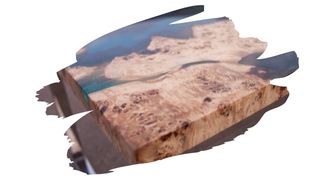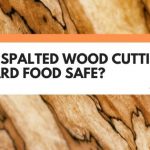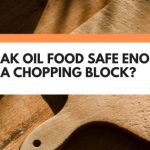Is food safety important when it comes to your cutting board finish? Absolutely it is — you could go so far as to say it should be the key deciding factor in your choice of wood finish.
You see, food safety is always a top priority when it comes to eating, but it’s especially important when it comes to cutting boards. Why? Because the last thing you need getting into your dinner is a toxic chip of resin. But, what does this mean for your dreams of a beautiful epoxy resin decorated cutting board?
Well, in this article, we dive into the difference between a food safe and a food grade finish. We also cover why the key difference between these two wood finish standards matters.
You will also discover what really goes into epoxy resins sealers (spoiler alert: there’s nothing in them that you’ll want to risk coming into contact with your food).

This post may contain affiliate links to products that we receive a commission for (at no additional cost to you). Learn more here.
What Is Epoxy Resin Actually Made Of?
Epoxy resins are one of the most tough and water resistant wood sealers you can use. And that’s all down to their core ingredients, which includes hardeners, epoxy resin monomers (ERMs), and plasticizer additives.
But, what epoxy resins do not contain is solvents. Solvent-based finishes release a lot of fumes (also known as off-gassing) as they dry. These are called VOC’s (volatile organic compounds) and they are responsible for those headache inducing fumes.
Still, that doesn’t mean epoxy resins aren’t capable of off-gassing. Even low-VOC epoxy resins can release unfriendly fumes as they go through their drying and curing process.
And, epoxy should be handled with care (i.e. always where gloves!). That’s because if epoxy gets onto your skin, it can cause severe irritation and allergic reactions.
However, once cured, epoxy resins form an incredibly hard substance. In fact, epoxy resins are often as hard (or even harder) than the very timber they’re coated onto.
Related Post: Can You Apply Epoxy Over Danish Oil? (Best Practice Revealed)
So Can You Buy Food Safe Epoxy Resin?
Any wood finish that dries, cures and solidifies into a hard material, can arguably be called a food safe finish. But, epoxy resin is not food safe until it has gone through a chemical process that changes it into its final hard resinous form. And that process is called curing.
Curing takes much longer than drying. It can take epoxy anywhere from 1 to 4 weeks to cure, (depending on the climate). However, a cured food safe wood finish is not the same thing as a food grade wood finish.
Related Post: Can You Apply Epoxy Over Shellac? (3 Key Things You Need To Know)
What’s The Difference Between Food Safe And Food Grade?
Food grade finishes are safe enough to come into ‘direct’ contact with food. These finishes tend to contain ingredients that are safe for human consumption. And they do not contain any toxic chemicals that could possibly leech into food.
On the other hand, a food safe finish is safe enough to come in ‘indirect’ contact with food. Which means that — after wholly curing — it is no longer secreting resins or releasing fumes. So, that means there’s little chance of epoxy resin getting into any nearby food.
Now, the reason why food safe epoxy resins are only suitable for indirect food contact, is because they aren’t wholly insurmountable. Some types of epoxy can dissolve if they come into contact with alcohol or vinegar.
That’s why a food safe epoxy, (or indeed any food safe finish), must not come into direct contact with hot food and liquids. In other words, you must not use a food safe finish to seal something like a wooden spoon or spatula.
Is An Epoxy Countertop Food Safe? Yes it is. Provided it’s been given sufficient time to cure, it’s fine for indirect contact with food. Which means you can put your dinner plate on it, but you should be wary about eating your dinner directly off of it. Although, to be honest, why would you?
Can’t I Use Food Safe Epoxy On My Cutting Board?
If that board is purely decorative, you can go right on ahead. Otherwise, you should not coat it in epoxy, because epoxy is an indirect-food-contact material.
What’s more, you shouldn’t use epoxy to seal a food prepping cutting board, because it isn’t a practical wood finish for chopping blocks. You see, there are two important reasons why we don’t use epoxy finishes on a cutting board;
1). Epoxy Resins Can Be Damaged When You Prepare Food On That Cutting Board
All of that chopping, cutting, and washing, means that epoxy resin is going to be more of a hindrance than a help. If you chop hard enough, you could end up gouging a cured epoxy surface.
But, more worryingly, those nicks and holes can make it all too easy for food bits to get caught up in. And that can expose you to the greater risk of food poisoning, due to the cross-contamination of raw meat.
2). Cutting Boards Need A Food Grade (Not Merely A Food Safe) Wood Finish
There are plenty of food safe finishes out there that are arguably better for wood than epoxy. Finishes such as Tung oil, Linseed oil, Danish oil and Polyurethane. All of those finishes, just like epoxy resin, can be classed as food safe.
But, chopping blocks need a food grade finish, not just a food safe one. Which is why 100% pure food-grade mineral oil is the best finishing option for a chopping block.
This penetrating oil finish is non-drying, non-toxic and enhances wood grain brilliantly. It doesn’t decay or go rancid, as it is made from refined petroleum distillate. And best of all, it is water-repellent, helping to protect wood by making wood fibers less water absorbent.
Mineral oil finishes are much easier to apply and maintain than epoxy resin. And you won’t need to wait long (after application) to begin using your chopping block. You can begin using a cutting board within 24 hrs of an application of mineral oil.
Related Post: Walnut Oil Vs Mineral Oil: Which One’s Better For Your Cutting Board?
And What Is Mineral Oil Exactly?
Mineral oil is made from petroleum. This is the same stuff found in diesel and mineral spirits.
Now, there are many different types of mineral oil products, such as Paraffin oil for example. However, food-grade mineral oil is not toxic at all, because this particular mineral oil version has been thoroughly filtered and refined.
Food grade mineral oil is widely used as a non-drying wood preserving finish. And you can buy it from most local stores and pharmacies.
Can You Put Epoxy Resin On A Butcher Block? Is it a purely decorative butcher block that’s not going to be used for food prep? Then, yes you can. Otherwise, you’ll run into the same problems as using epoxy resin on a cutting board.
To Wrap Up, Here Are The 3 Key Takeaways From This Post…
- 1). Epoxy resins are food safe once they’ve finished curing. Epoxy takes a few days to dry, but can take up to a month to cure (depending on the brand, climate, etc).
- 2). Epoxy is safe enough for indirect contact with food, making it suitable for kitchen countertops. However, it is not suitable for direct food contact.
- 3). For a practical food safe cutting board finish, simply use 100% pure food grade mineral oil.
References:
Epoxy Resin | Science Direct
FDA Compliant, Food Grade and Food Safe | Industrial Specialties Mfg. & IS MED Specialties



